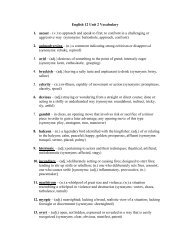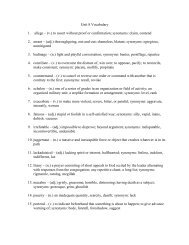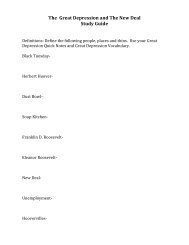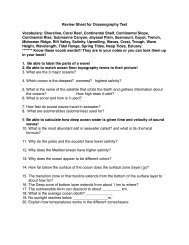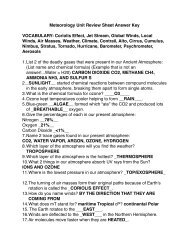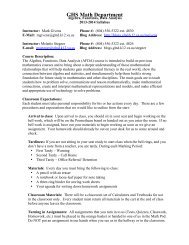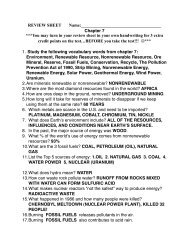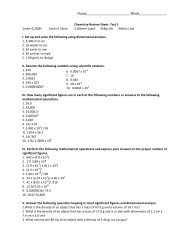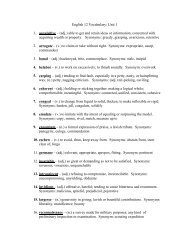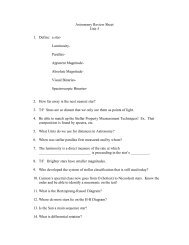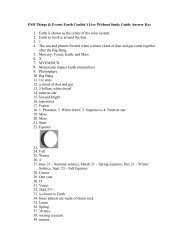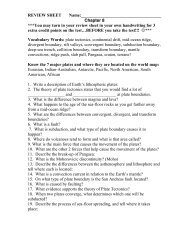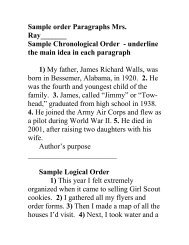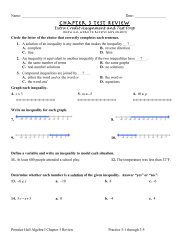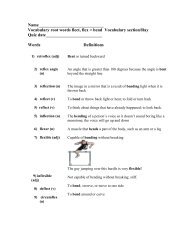Civics and Economics Review - Documents, Principles, Citizenship
Civics and Economics Review - Documents, Principles, Citizenship
Civics and Economics Review - Documents, Principles, Citizenship
You also want an ePaper? Increase the reach of your titles
YUMPU automatically turns print PDFs into web optimized ePapers that Google loves.
<strong>Civics</strong> <strong>and</strong> <strong>Economics</strong> <strong>Review</strong> - Structure <strong>and</strong> Powers of the Government<br />
3<br />
The Constitution of the United States defines the structure <strong>and</strong> powers of the national<br />
government. (CE.6a)<br />
The powers held by government are divided between the national government<br />
in Washington, D.C., <strong>and</strong> the governments of the 50 states.<br />
Legislative, executive, <strong>and</strong> judicial powers of the national government are<br />
distributed among three distinct <strong>and</strong> independent branches of government.<br />
What is the structure of the national government as set out in the US Constitution?<br />
Legislative Branch<br />
The Congress is a bicameral legislature consisting<br />
of the House of Representatives<br />
(435 members based upon population)<br />
<strong>and</strong> the Senate (100 members, two per state)<br />
Makes the laws of the nation<br />
Approves the annual budget<br />
Confirms presidential appointments<br />
Raises revenue through taxes <strong>and</strong> other levies<br />
Regulates interstate <strong>and</strong> foreign trade<br />
Declares war<br />
Executive Branch<br />
Headed by the president of the United States, the<br />
chief executive officer of the nation<br />
Executes the laws of the l<strong>and</strong><br />
Prepares annual budget for congressional action<br />
Appoints cabinet officers, ambassadors, <strong>and</strong><br />
federal judges<br />
Administers the federal bureaucracy<br />
The executive branch plays<br />
a key role in the<br />
policymaking process.<br />
Judicial Branch<br />
Consists of the federal courts, including the Supreme Court, the highest court of<br />
the l<strong>and</strong><br />
The Supreme Court exercises power of judicial review<br />
The federal courts try cases involving federal law <strong>and</strong> questions involving<br />
interpretation of the Constitution of the United States.<br />
Separation of Powers (CE.6b)<br />
The powers of the national government are separated among three branches of<br />
government in ways that limit any one branch from abusing its power.<br />
The Constitution of the United States (Articles I, II, III,) defines the powers of the<br />
legislative, executive <strong>and</strong> judicial branches of the national government.<br />
Checks <strong>and</strong> Balances (CE.6b)<br />
Each of the three branches of the<br />
national government limits the<br />
exercise of power by the other two<br />
branches.<br />
The Legislative Branch:<br />
The Congress checks the<br />
President when legislators<br />
- override Presidential<br />
vetoes<br />
- impeach/convict a<br />
president<br />
The Congress checks the courts when legislators<br />
- confirm or refuse to confirm judges/justices<br />
- impeach <strong>and</strong> convict judges or justices<br />
The Executive Branch:<br />
The President checks<br />
Congress when the<br />
President<br />
- proposes legislation;;<br />
- prepares an annual budget<br />
for Congress to approve;;<br />
- call special sessions of Congress;;<br />
- vetoes legislation Congress has passed.<br />
The president checks the courts when the<br />
president appoints judge/justices.<br />
The Judicial Branch:<br />
The courts check<br />
Congress when judges<br />
/justices declare acts of<br />
Congress to be<br />
unconstitutional.<br />
The courts check the President when<br />
judges/justices declare executive actions to be<br />
unconstitutional.<br />
Explaining <strong>and</strong>/or Simulating the Lawmaking Process (CE.6c)<br />
Officials who are elected to serve in the national legislature make laws.<br />
National laws are made by Congress. All citizens can learn the<br />
<br />
through direct participation <strong>and</strong> simulations.<br />
Types of legislative powers<br />
1. Expressed: Specifically listed in the Constitution of the United States<br />
2. Implied: Used to carry out expressed powers<br />
How does a bill become a law in Congress?<br />
Introducing a bill by a Senator or Representative<br />
Working in committees<br />
Debating the bill on the floor of each house<br />
Voting on a bill in each house<br />
Sending the bill to the president to<br />
sign into law<br />
Elected officials in Congress write laws <strong>and</strong> take action in response to<br />
problems or issues.<br />
Individuals <strong>and</strong> interest groups help shape legislation.<br />
The formal powers of Congress are limited by the Constitution of the<br />
United States.<br />
Citizens (including students) learn the importance of the legislative<br />
process through direct involvement <strong>and</strong>/or simulations.<br />
Roles <strong>and</strong> powers of the Executive Branch of the national<br />
government (CE.6d)<br />
The executive branch plays a key role in the policymaking process.<br />
Cabinet departments, agencies, <strong>and</strong> regulatory groups interpret <strong>and</strong><br />
execute the laws.<br />
Presidential power is broad in both domestic <strong>and</strong> foreign affairs, but<br />
there are limits on what the president can <strong>and</strong> cannot do.<br />
Ways the executive branch influences policymaking<br />
1. Proposing legislation in an annual speech to Congress<br />
(State of the Union Address)<br />
2. Appealing directly to the public<br />
3. Approving or vetoing legislation<br />
4. Appointing officials who carry out the laws<br />
The power of the president has grown in the years since the<br />
Constitution was ratified.<br />
What are the roles <strong>and</strong> powers of the president?<br />
Chief of State<br />
- Ceremonial head of government<br />
Chief Executive<br />
- Head of executive branch<br />
Chief Legislator<br />
- Proposer of legislative agenda<br />
Comm<strong>and</strong>er-in-Chief - <br />
Chief Diplomat<br />
- Architect of American foreign policy<br />
Chief of Party<br />
- Leader of the political party that<br />
controls executive branch<br />
Chief Citizen<br />
- Representative of all of the people<br />
Virginia St<strong>and</strong>ards of Learning (2008), Rebecca Mills, Supervisor of Social Studies, Spotsylvania County Schools



